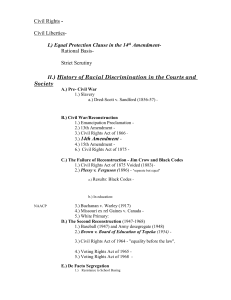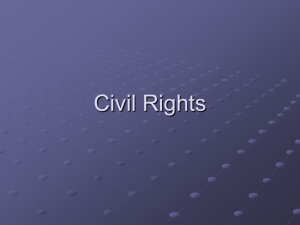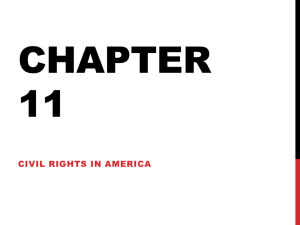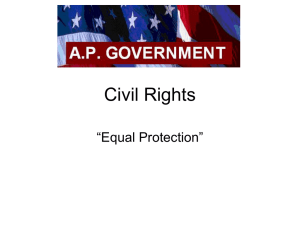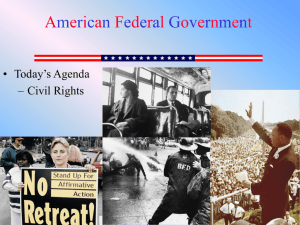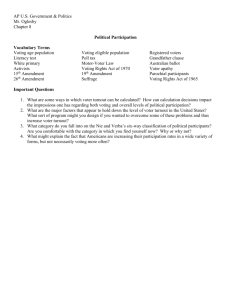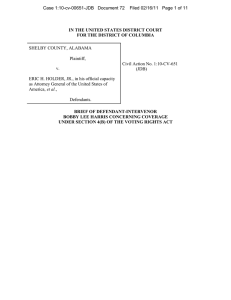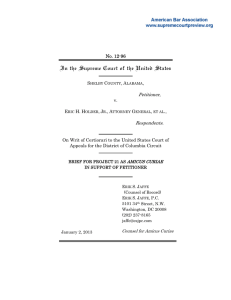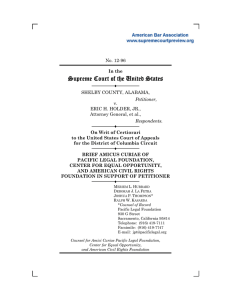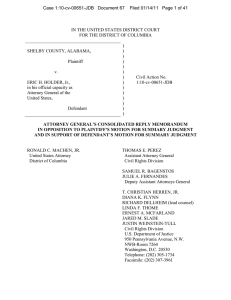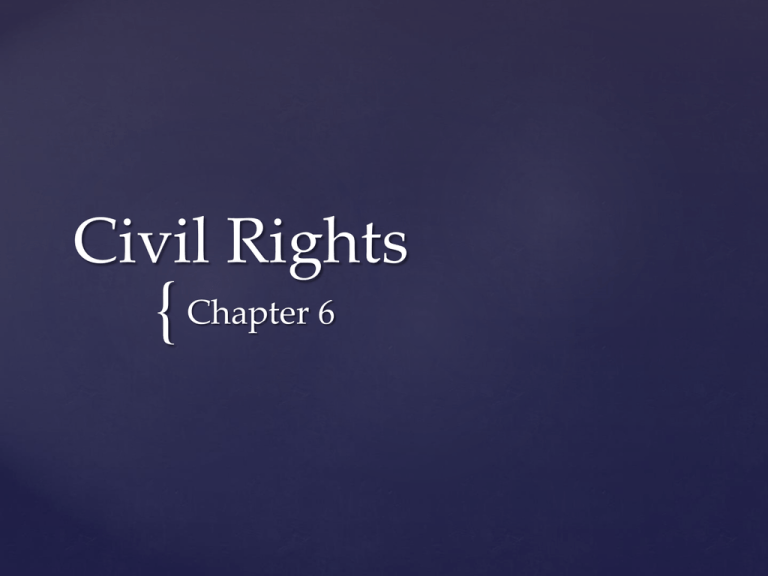
Civil Rights
{ Chapter 6
Civil Rights
Policies designed to protect people against
arbitrary or discriminatory treatment by
government officials or individuals
Racial Discrimination
Gender Discrimination
Discrimination based on age,
disability, sexual orientation and other
factors
Introduction
Fourteenth Amendment: “…equal protection of
the laws”
Due Process
Equal Protection clause is applicable to the federal
government and the states
It does not apply to private institutions with
restricted memberships such as country clubs.
Fourteenth Amendment
Equality for African Americans
Plessy v. Ferguson (1896): Separate but equal – classification
by race is okay with equal treatment
After the Civil war – 14th and 15th Amendments
Jim Crow Laws: segregated African Americans in virtually all
public facilities
Determined it doesn’t violate the equal protection clause
Brown v. Board of Education (1954): Classification causes
inferiority in those separated therefore violates the equal
protection clause
Desegregated all public schools and ended Jim Crow Laws/Legal
segregation
Civil Rights for Racial and
Ethnic Minorities
Hispanic Americans
Mexican American Legal Defense and Educational Fund (MALDEF) –
focuses on equal funds to schools and implement bilingual education
programs as well as voting rights and opportunities
Native Americans
Native American Rights Fund (NARF)
The Native American Language Act (1990)
Entitled to use their own languages
Asian and Pacific Island Americans
Korematsu v. U.S. (1944)
Other Minority Rights
Suffrage: The legal right to vote
Suffrage Movement: The drive for voting rights for women that
took place in the U.S. from 1890 to 1920.
Nineteenth Amendment: Extended suffrage to women in 1920.
Guaranteed women the right to vote.
Title IX of the Education Amendment of 1972: requires equal
spending by sex in universities. If any federal money is used, all
will be cut if colleges don’t spend equal amounts on men and
women’s programs
Based from Grove City College v. Bell case
Equal Rights Amendment: States “Equality of rights under the law
shall not be denied or abridged by the United States or any state on
account of sex.”
*Roe v. Wade (1973)
Women and Equal Rights
Wide-ranging legislation passed by Congress to
outlaw segregation in public facilities and
discrimination in employment, education, and
voting
Created the Equal Employment Opportunity
Commission (EEOC)
Made racial discrimination illegal in many areas
Strengthened voting right legislation
Employment: Title VII prohibits employers from
discriminating against employees based on race,
sex, age, and national origin (1978 – pregnancy)
Civil Rights Act of 1964
Helped end formal and informal barriers to
voting
No changes to voting laws without federal
district courts giving approval
No poll tax
No literacy tests
Voting Rights Act of 1965
Very recent topic involving civil rights
Just like African Americans and women, gays and
lesbians have worked through the courts to
achieve incremental legal change.
Lambda Legal Defense and Education Fund
Lesbian Rights Project
Gay and Lesbian Advocates and Defenders
“Don’t Ask, Don’t Tell” – Clinton
Same-sex marriage
Lawrence v. Texas (2003)
Sexual Orientation
Americans with Disabilities Act (1990)
Officially defines a disabled person as someone with a
physical or mental impairment that limits one or more
“life activities”, or who has a record of such impairment.
Extends the protections of the Civil Rights Act of 1964
Guarantees access to public facilities, employment, and
communication services.
Requires employers to acquire or modify work
equipment, adjust work schedules, and make existing
facilities accessible to those with disabilities
Ex: Wheelchairs and telecommunications devices
Americans with
Disabilities
Policies designed to give special attention or
compensatory treatment to members of a
previously disadvantaged group.
Regents of the University of California v. Bakke (1978)
Accepts some form of affirmative action
Rejects racial quotas
Schools can use race as a plus factory but not THE factor
Affirmative Action

